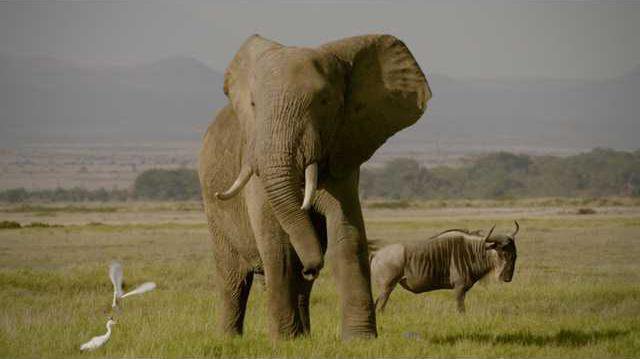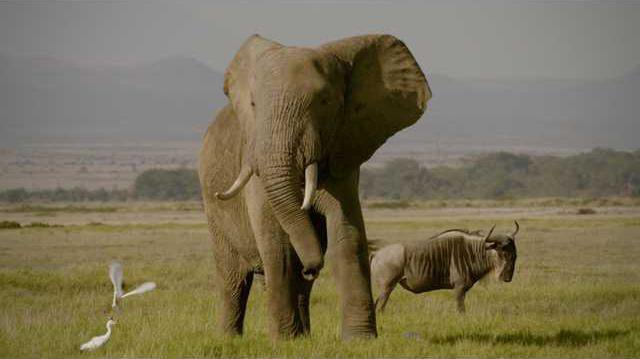"THE IVORY GAME" 3 1/2 stars directed by Richard Ladkani and Kief Davidson, executive producer Leonardo DiCaprio; not rated; Netflix
A dank room comes into view with several people milling about. Spread throughout the entire floor and piled up against the walls are tons upon tons of dirty, fresh elephant tusks. People in a line pass down an individual tusk until it reaches the last person, who carefully stacks it on top of a high pile.
"We don't have enough shelf space for all this ivory," says the program manager.
This is just one of many impactful scenes included in Netflix's new original documentary, "The Ivory Game," that released Friday.
The Ivory Game is not the typical activist documentary using feeble attempts of stirring emotion to sway the audience toward the cause. Rather, the film has a solid foundation of evidence and substantial exploration of the ivory situation to display it as a real crisis. It gives voice to the activists, conservationists and investigative journalists who have dedicated their lives to protecting elephants against poachers.
Directors Richard Ladkani and Kief Davidson jump back and forth between the elephant poaching in Africa and the ivory black market in China. Filming in Africa concentrates on both wild elephants and greedy poachers. China's side of the story gives insight into a culture where ivory is a status symbol of the wealthy. It also shows how the illegal system of obtaining ivory is safeguarded by shops that legally and publicly sell it.
As an executive producer of "The Ivory Game," Leonardo DiCaprio adds to his recent efforts to be a voice for environmentalism.
Having people like Jane Goodall and Leonardo DiCaprio, who are very passionate, helps keep us going," Davidson said in an interview with "Entertainment Tonight," "because this in particular more than anything that either of us have worked on before was the most difficult film weve ever done.
Filming in each continent presents dangerous situations. Between undercover infiltrations with heads of the black market and hunting down poachers responsible for the deaths of thousands of elephants, there is no doubt that filming "The Ivory Game" was a risky undertaking.
The filmmakers display a vast range of cinematography, including aerial shots over plains and big cities, high-definition close-ups of elephants, undercover cameras infiltrating the black market and night-vision shots chasing down poachers.
While scenes were artfully shot, perhaps even more impactful is the content they were able to capture within the frame. Viewers see Chinese stores piled full of artfully crafted ivory, recently poached elephant carcasses with their tusks ripped away and top tradesmen explaining their heartless ivory sales systems.
Rhinos, however, did not get a share in the documentary, even though they are hunted for their horns and consequently also severely affected by the ivory crisis. Perhaps the filmmakers felt they had enough ground to cover by focusing only on elephants; the documentary surely never felt stretched thin for content. Yet it does fail to mention how the alarmingly quick decline in elephant population is affecting Africas ecosystem. The shown effects of poaching end at elephant carcasses.
As the number of elephants goes down, the price of ivory climbs higher and higher. For this reason, traders in ivory actually want the extinction of elephants, says Craig Millar, a conservationist quoted in the film. Alarmingly, even though the Chinese and U.S. governments have begun working to end the ivory trade, poachers kill an elephant every 15 minutes, according to the documentary.
This is not a documentary that, once finished, is likely to have viewers thinking to themselves "that was nice," and then going on with their lives. "The Ivory Game" and its message stick. It is impactful and will make viewers seriously consider the simple concluding invitation to take action by visiting theivorygame.com.
"The Ivory Game" is not rated but includes disturbing images of animal cruelty and brief strong language; running time: 112 minutes.
A dank room comes into view with several people milling about. Spread throughout the entire floor and piled up against the walls are tons upon tons of dirty, fresh elephant tusks. People in a line pass down an individual tusk until it reaches the last person, who carefully stacks it on top of a high pile.
"We don't have enough shelf space for all this ivory," says the program manager.
This is just one of many impactful scenes included in Netflix's new original documentary, "The Ivory Game," that released Friday.
The Ivory Game is not the typical activist documentary using feeble attempts of stirring emotion to sway the audience toward the cause. Rather, the film has a solid foundation of evidence and substantial exploration of the ivory situation to display it as a real crisis. It gives voice to the activists, conservationists and investigative journalists who have dedicated their lives to protecting elephants against poachers.
Directors Richard Ladkani and Kief Davidson jump back and forth between the elephant poaching in Africa and the ivory black market in China. Filming in Africa concentrates on both wild elephants and greedy poachers. China's side of the story gives insight into a culture where ivory is a status symbol of the wealthy. It also shows how the illegal system of obtaining ivory is safeguarded by shops that legally and publicly sell it.
As an executive producer of "The Ivory Game," Leonardo DiCaprio adds to his recent efforts to be a voice for environmentalism.
Having people like Jane Goodall and Leonardo DiCaprio, who are very passionate, helps keep us going," Davidson said in an interview with "Entertainment Tonight," "because this in particular more than anything that either of us have worked on before was the most difficult film weve ever done.
Filming in each continent presents dangerous situations. Between undercover infiltrations with heads of the black market and hunting down poachers responsible for the deaths of thousands of elephants, there is no doubt that filming "The Ivory Game" was a risky undertaking.
The filmmakers display a vast range of cinematography, including aerial shots over plains and big cities, high-definition close-ups of elephants, undercover cameras infiltrating the black market and night-vision shots chasing down poachers.
While scenes were artfully shot, perhaps even more impactful is the content they were able to capture within the frame. Viewers see Chinese stores piled full of artfully crafted ivory, recently poached elephant carcasses with their tusks ripped away and top tradesmen explaining their heartless ivory sales systems.
Rhinos, however, did not get a share in the documentary, even though they are hunted for their horns and consequently also severely affected by the ivory crisis. Perhaps the filmmakers felt they had enough ground to cover by focusing only on elephants; the documentary surely never felt stretched thin for content. Yet it does fail to mention how the alarmingly quick decline in elephant population is affecting Africas ecosystem. The shown effects of poaching end at elephant carcasses.
As the number of elephants goes down, the price of ivory climbs higher and higher. For this reason, traders in ivory actually want the extinction of elephants, says Craig Millar, a conservationist quoted in the film. Alarmingly, even though the Chinese and U.S. governments have begun working to end the ivory trade, poachers kill an elephant every 15 minutes, according to the documentary.
This is not a documentary that, once finished, is likely to have viewers thinking to themselves "that was nice," and then going on with their lives. "The Ivory Game" and its message stick. It is impactful and will make viewers seriously consider the simple concluding invitation to take action by visiting theivorygame.com.
"The Ivory Game" is not rated but includes disturbing images of animal cruelty and brief strong language; running time: 112 minutes.





